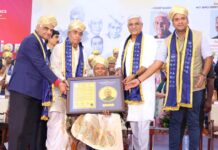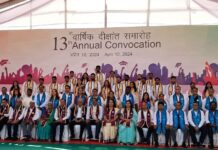Shri V. Muraleedharan, Hon’ble Minister of State for External Affairs, Govt. of India, was the Chief Guest at the Event
Thiruvananthapuram, May 23, 2023: The C20 Summit on Education and Digital Transformation has been inaugurated at Thiruvananthapuram. Several dignitaries from India and abroad attended the inaugural ceremony of the two-day event hosted by the official Engagement Group of C20 on Education and Digital Transformation (EDT).
Shri V. Muraleedharan, Hon’ble Minister of State for External Affairs, Govt. of India, was the Chief Guest, while Dr. Shashi Tharoor, Hon’ble Member of Parliament, Thiruvananthapuram, was the Guest of Honor. Other dignitaries present on the dais included Swami Amritaswarupananda Puri, Vice Chairman, Mata Amritanandamayi Math and Troika Member C20; Dr. Luiz Claudio Costa, Former Vice-Minister of Education, Brazil; and Armoogum Parsuramen, Former Education Minister of Mauritius and Former Director of UNESCO.
Addressing the delegates, Shri V. Muraleedharan, Hon’ble Minister of State for External Affairs, said: “We have ensured that India’s G20 presidency is not limited to just being a routine diplomatic exercise but is truly a people’s G20. The G20-related meetings are being organized all over India. So far, we have covered 41 cities, in which more than 12,300 delegates from 110 nationalities have participated. Unique experiences showcasing India’s diversity, inclusive traditions and cultural richness, have been made a part of the visiting delegate’s program.”
The Hon’ble Minister added: “India is advancing rapidly in digital education. The Indian Government is committed to reducing the digital divide and bringing the benefits of technology to all citizens. Upskilling the youth and increasing digitalizing in education are our top priorities. Our seriousness can be gauged by the fact that the education sector has received the highest ever allocation of USD 13.66 bn in the Union Budget. Numerous policy initiatives have been taken for the education sector. The New Education Policy has provided a framework for the digitalization of education by concentrating on digital infrastructure, blending learning, online platforms, open education resources and skill development. It is because of such initiatives that students living in the remotest corners of India can gain access to quality education today.”
He said: “The Government’s move to allow Indian universities to offer fully online degrees has helped hugely in widening access of students to higher education. Growing global collaborations with regards to online courses have raised the profile of Indian educational institutions worldwide. This gigantic transformation has been made possible by a massive and disruptive technological transformation. Additionally, India’s edtech sector is on the cusp of a phenomenal advancement due to the base of Internet users which is set to increase to 900 million by 2025.”
In her video address, renowned spiritual leader and humanitarian Mata Amritanandamayi (Amma), who is the Chair of C20 India, said: “Humanity is facing many extraordinary challenges today. Today, human beings need two qualities: the wisdom to recognize the problem and the mental attitude and intelligence to correct it. Everyone who lives in this world must obey the universal law of inclusion. If we try to forcefully impose laws of exclusion, it will only result in disharmony and danger. What we are experiencing today is the result of many people interfering with the fabric of the universe. The huge leap in science and technology, along with misuse of the Internet and increasing drug abuse among students, are all contributing to the predicament we face today.”
Amma added: “The ‘new’ should never be allowed to trample on the ‘old’. New discoveries can also mean unique, new hazards. Before such discoveries become a permanent headache to society, we need to find solutions to their potential negative repercussions and threats that could manifest. Another concern is the mental health of children after the COVID pandemic. The children appear to be quite different from their former selves. What they have is the beginning of a depression and anxiety disorder that results from smartphone overuse. If we catch it at the beginning and offer timely counselling, it can be prevented from deepening into a psychological problem. Otherwise, they will become psychologically affected for life.
Addressing the audience, Dr. Shashi Tharoor, Hon’ble Member of Parliament, Thiruvananthapuram, said: “A study conducted among 10,000 students in 400 Indian cities revealed that only 17% had access to laptops, and just 4% had access to smart tablets. Another report highlighted the infrastructural challenges in government schools, with only 28% of them having computers and a mere 12% having an Internet connection. This lack of connectivity is particularly prevalent in rural schools, exposing the shortcomings of online education during the COVID-19 pandemic. A study by Oxfam across five Indian states showed that over 80% of respondents believed that digital schooling had failed children during the lockdown. It is a significant challenge that we must confront and address.”
He added: “Today, the definition of education must include digital literacy for children to access contemporary knowledge sources. Digitizing classrooms and introducing a national computer curriculum in all languages is necessary. This would enable even primary school children to gain a basic understanding of computers and digital technology. Adequate funds must be allocated by the government to ensure the availability of computers and provide training to teachers. Without such measures, and considering existing barriers of class, caste, and gender, pushing towards online education may further divide society rather than being a tool for progress.”
Said Swami Amritaswarupananda Puri, Vice Chairman, Mata Amritanandamayi Math and Troika Member C20: “As Amma says, the main purpose of education should be to impart a culture of the heart. It is true that our students are passing their exams with flying colors, and we are creating brilliant scientists and engineers. But what does our education system do to instill a culture of the heart in our students? How many loving, compassionate, and selfless human beings did our education system create in the last century? Our education system needs a total revamp so that it can create more compassionate people, more lovers than haters. We need more people who look at the world with wonder, who would fall in love with nature, and unconditionally appreciate the unparalleled efficiency, effectiveness and accuracy of the Creator.”
He added: “The need of the hour is to have more good-hearted people who would adore the diversity of the universe. Only right education that inculcates the right values can bring about this transformation. We have to ensure that digital transformation actually benefits the students, and not harm them by giving them access to undesirable information and influences. Gathering worldly information should be balanced with nourishment for our souls. It is time to seriously contemplate, what are we doing in the name of education? Are we in the process of creating human machines, instead of human beings? Devoid of spiritual understanding, humans themselves will become artificial intelligence in the future.”
The Summit saw the launch of the Amrita Kutumbakam app created by Amrita CREATE, an educational technology initiative of Amrita Vishwa Vidyapeetham. There are 80 million refugees and asylum-seekers in the world who have been forced to escape their homes due to some form of violence. The free and multi-lingual app, an example of digital transformation for social good, connects CSOs and NGOs with refugees and displaced people whom they serve. Many international collaborators from African and the Middle East have committed to implementing the Amrita Kutumbakam app to better serve their refugee communities, according to Dr. Prema Nedungadi, Director, AmritaCREATE and National Coordinator, C20 India, Education & Digital Transformation Working Group.
Across two days, hundreds of delegates from Civil Society Organisations (CSOs) experts, and stakeholders will have discussions to identify the most pressing challenges focusing on education and digital transformation and work towards documenting innovative solutions, recommendations, and best practices. The outcome of these deliberations will directly impact the policy recommendations to be launched at the C20 Summit in July 2023.
More information on this engagement group and the C20 can be found at https://c20.amma.org/tst-wg/
The G20 (Group of 20) is a forum comprising 19 countries and the European Union. It works to address major issues related to the global economy. C20 provides a platform for Civil Society Organizations (CSO) around the world to voice people’s aspirations to the world leaders in G20.
Corporate Comm India (CCI Newswire)






























